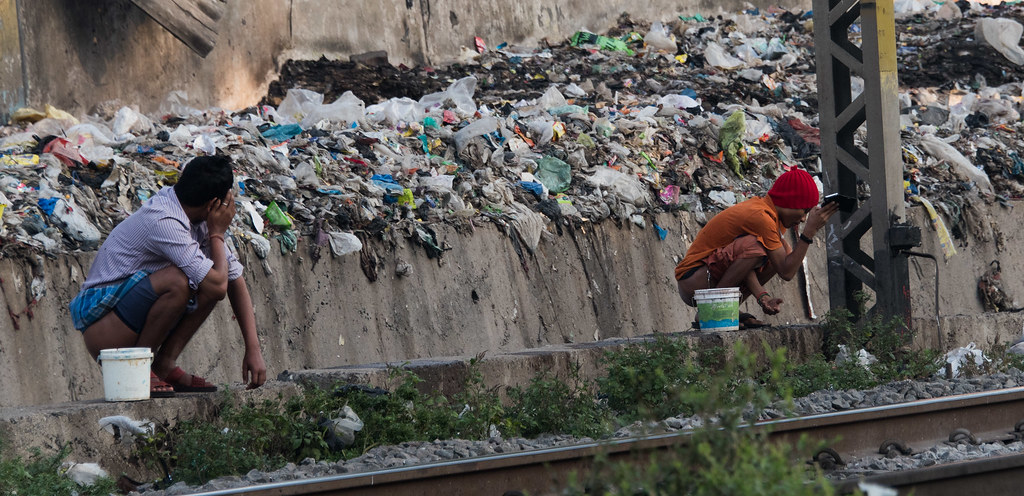As part of the Swachh Bharat Abhiyaan, one of the interventions adopted at many places is formation of Nigrani committees to keep a watch on, and dissuade people from shitting in the open. These Nigrani committees adopt different tools, from pleading with open daefecators, to whistling (usually by children teams) to ‘gandhigiri’. The picture below is about ‘gandhigiri’ being practiced in a village in Madhya Pradesh– a motivator, giving rose to a person who is shitting in the open.
Although ‘gandhigiri’ to convince open daefecators is not something unheard; this picture generates some weird feeling. It is not easy for the one who is giving rose – this man, and may be hundreds, thousands of motivators across India are becoming part of this silent ( away from media glare) revolution of eliminating ( open) shit. Hats off to them, for they are doing it for a bigger cause.
But, what draws more attention is the sitting person accepting the flower and willingly (at least not resisting!) accepting the flower. This churns something inside. This is not normal. Understandably, people, if they are not yet ready for a change to construct their toilet, would be expected to resist an attempt to give them a flower while doing a very private activity. What has begotten us? What has become of a society, that continues a practice, so disgusting, despite attempts to change it. This inertia, this coldness stabs right through. And the sitting person alone cannot be blamed.
Many years ago, a sarpanch while working in Maharashtra, asked this to people – why should toilets be constructed to protect the ‘dignity and shame’ of women. Men have no shame that needs to be protected ? The consensus that emerged after discussion in that village was that men do have shame; however they have found an alternative to protect it – they won’ t stand up when someone crosses them; they will just look down ( and believe no one is there)!
But this sitting man is not even looking down !
What are the possible reasons then, that this man is not uncomfortable getting clicked? One possibility is that we, as people, have refused to let anything surprise or shock us. This is certainly not good. A book brings out, with evidence, that the most common mistakes we do are the ones we know, and still do them knowingly. It may be human psychology, although the levels to which it is at stark display, and the trend towards its strengthening is disturbing.
There is one more issue.
And it is about the way social change programmes should be implemented – in conjunction with the people, taking them along. This requires reaching out to the entire community – the men, the women, the children, the elderly, the poorest and the vulnerable – and letting them debate questions relating to them.
Out of these discussions emerge natural leaders – the class of people willing to do something selflessly for their village. People with such potential are there in every community. In earlier days, and may be even today, in some tribal/other communities, there are these informal institutions – an elderly man in the village etc.- to whom the entire village listens. In the era of more formal institutions, the divisions – political and others – are more stark; and therefore, the task to bring out such natural leaders from amongst the community much more difficult. Nevertheless, that should strengthen our resolve to reach out even deeper, to more people, and engage them more closely.
There need be no fear that it will be difficult to convince people. People already know. ‘We’ need to listen. Sane voices cannot be quelled in a wider discussion. There may still be only few who will take a plunge, and come forward to do something for the village, including doing Nigrani at 4 am in the morning against open defecators. However, there will be a silent 80% who will back these few. And the invisible force of these silent 80% will strengthen the few; and ensure that the odd defaulters resist an open picture of them doing something that the village now considers anti-social.
An effort to do a Nigrani, before influencing a majority of the villagers; or an effort to do the same from outside (the person in the picture above seems an outsider, not from the same village) may not be enough.
The change has to come from within. This is the message of Swachh Bharat. It is a war bigger than toilets.




non violent, non coercive methods have proved to be more effective in enabling and facilitating community empowerment. The history of the Swachhata Movement in our country has endorsed this through sustainable behavioural change in such communities.